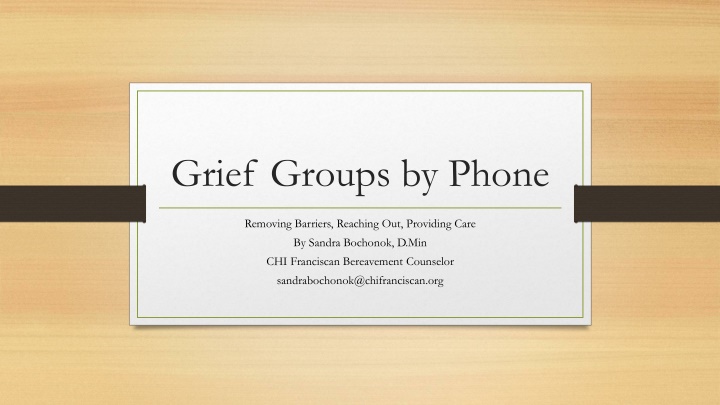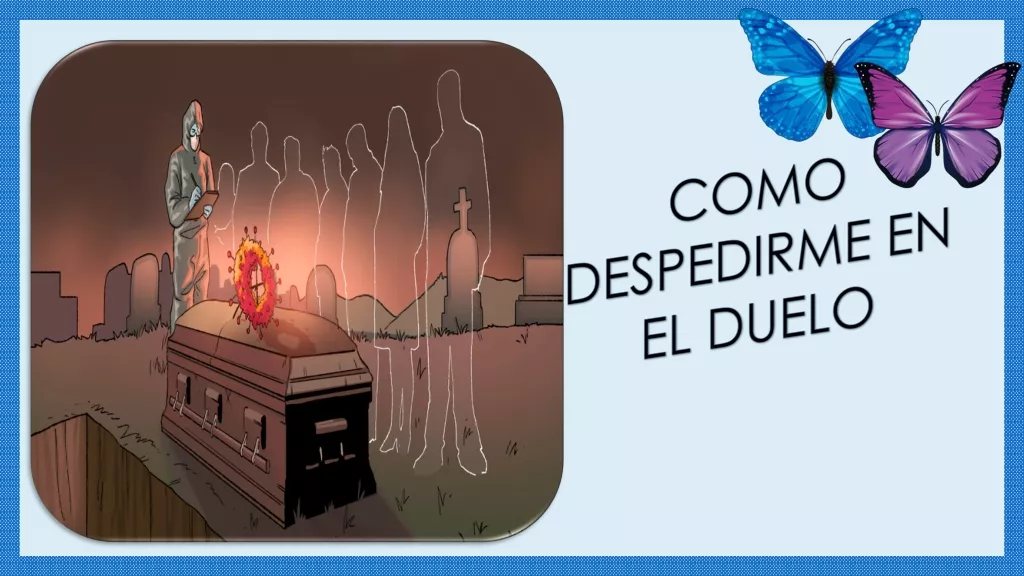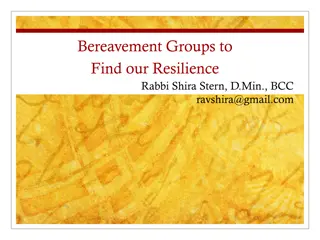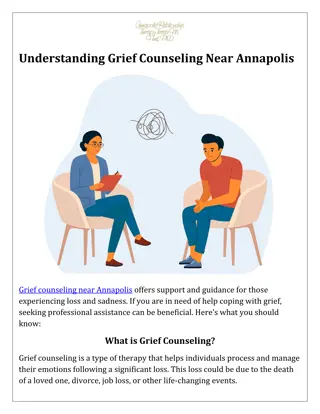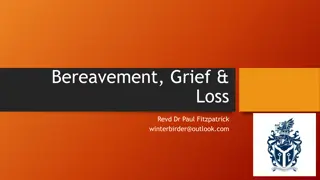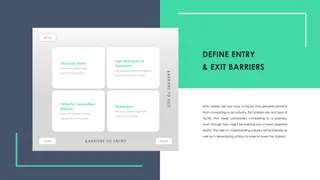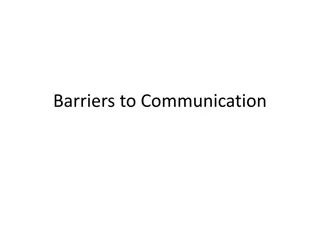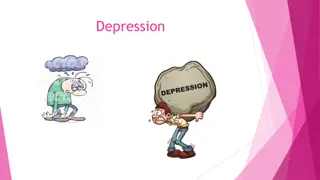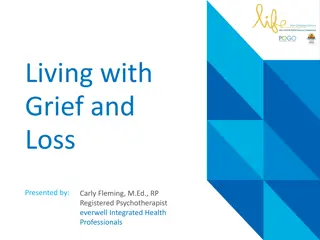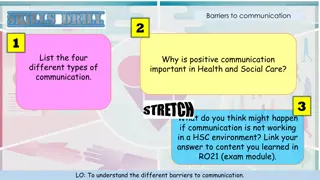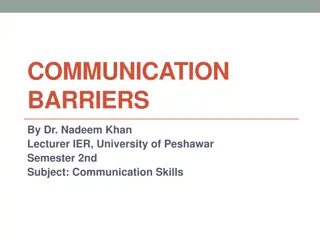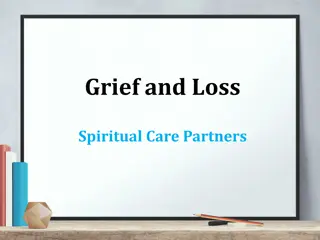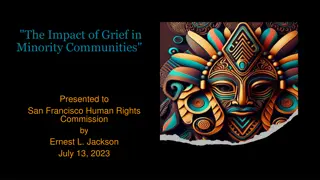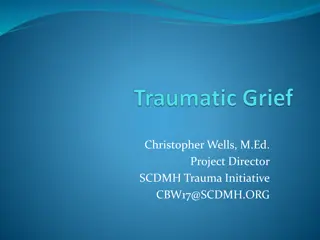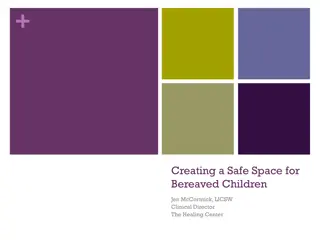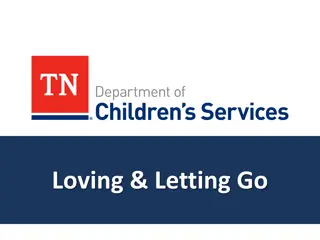Grief Groups by Phone: Removing Barriers, Reaching Out, Providing Care
Explore the evolution and effectiveness of phone support groups for bereavement, highlighting the challenges and opportunities faced by organizations like CHI Franciscan and Sloan Kettering Medical Center. Discover the impact of virtual electronic options in providing e-grief support and learn about the history and benefits of phone groups since the 1960s.
Uploaded on Sep 19, 2024 | 4 Views
Download Presentation

Please find below an Image/Link to download the presentation.
The content on the website is provided AS IS for your information and personal use only. It may not be sold, licensed, or shared on other websites without obtaining consent from the author.If you encounter any issues during the download, it is possible that the publisher has removed the file from their server.
You are allowed to download the files provided on this website for personal or commercial use, subject to the condition that they are used lawfully. All files are the property of their respective owners.
The content on the website is provided AS IS for your information and personal use only. It may not be sold, licensed, or shared on other websites without obtaining consent from the author.
E N D
Presentation Transcript
Grief Groups by Phone Removing Barriers, Reaching Out, Providing Care By Sandra Bochonok, D.Min CHI Franciscan Bereavement Counselor sandrabochonok@chifranciscan.org
Best practice 2017 Joint Commission Survey recommendation
NHPCO Regulatory Compliance Medicare Conditions of Participation Bereavement mandate for one year Hospices vary greatly in resources and trained personnel Challenges and community requests Financial realities
CHI Franciscan 2014 Situation Rapid numerical growth spurt Increased geographical coverage Higher demand for bereavement follow up Limited staff and budget restrictions Bereavement department brainstorming how can we do more with what we have? Who are the overlooked and underserved? How can we reach out more effectively?
Sloan Kettering Medical Center program SKMC offered a model of phone support groups Group specific patients with different cancers, caregiver support and bereavement Phone groups facilitated by trained social workers/bereavement counselors All participants were required to register through a registrar It was a free, time tested service
Virtual Electronic options Many possibilities for e- grief support Each had challenges: websites, chat rooms, closed Facebook pages, U-tube videos Health care using more virtual options for health, wellness and support groups Phone support groups are the lowest tech option and common denominator. Not all bereaved clients had computers or were not technically savvy
Phone groups Have been in existence since 1960 s Used throughout the world for local, national and global support AA, Crisis lines, group specific phone groups, distance learning classes Bereavement phone counseling a big part of follow up IDT meetings already using a toll free conference line by field staff
Grief Groups by Phone A valuable, low cost supplement to existing programs of traditional grief groups, workshops and special events Increases bereavement availability to clients for any client with a phone Provides a valuable service to community bereavement clients Followed the Sloan Kettering format requiring pre-registration 2015 launched twice monthly phone support group
Simple one hour format Facilitator welcomes callers Ground rules (what happens in Vegas stays in Vegas) A very brief reading First name intros and what they most need from the hour Caring and sharing, facilitated by counselor Educational moment Summation and reminder of next group date (1stand 3rdFriday)
Who used the twice monthly phone group? A woman calling from New Jersey A 46 year old man calling from a train station in Spokane A community bereavement client without insurance A blind, elderly, homebound widow Clients registered and called from NJ, WA, NC, NV, OR, CA, HI, GA and ALA Clients registered but have not yet called from Belize and Sweden
The 6 Week Phone Group Program Based on our traditional six week group format and curriculum Each week had a topic, reading material, an assignment A surprising demographic for first pilot group: older widows from 2 states Second six week pilot had younger widows from 3 states
Phone Program Advantages Saved clients travel time and travel costs Made bereavement support more accessible for those unable to attend a traditional group, or who lived where no groups were available Provided a degree of anonymity that was comforting to some Clients called from the comfort of their homes, the privacy of their office, cars and hotel rooms Some clients focus better audibly on what is shared
More Advantages With good listening skills, counselors can be very effective Reduces psychological barriers that discourage some from seeking help It is convenient and affordable No geographical limitations to phone counseling Saves office expenses, it s a green way to counsel Some people are more relaxed on the phone Saves counselor time used otherwise for travel, set up, meeting and greeting, clean up Easy documentation
Disadvantages to Phone Program Some do not like to talk on phone Calls can be interrupted, or affected by situational pressures No guaranteed privacy: loudspeakers, recordings, multiple phone connections Can contribute to distance in the therapeutic relationship. Some feel safer in the physical presence of another person If counseling staff is rotated through group, repeat callers cannot develop a relationship in the same way as in traditional therapy Some clients are inappropriate for phone group
Other Difficulties Some cannot talk on phone due to speech problems Hearing impairments Physical weaknesses or infirmities Time management Inappropriate clients Poor cell coverage and dropped calls
Client Comments I don t want it to stop! You pulled me off the edge of the cliff today. I am deeply grateful for this program loved the convenience I still feel like a fledgling widow but this six week phone group helped me know I have wings. It s great for people like me who don t drive
Questions for consideration Would a phone support group enhance, supplement or improve your hospice bereavement care accessibility to your clients? Would such a program benefit those who otherwise might be overlooked or underserved, including your elderly, blind, mobility restriction, as well as those who cannot access a local support group? Would this care concept provide an inexpensive, low tech and convenient way to expand or enhance your current programs?
Summation Local, national and international potential Low cost, low tech, low overhead Multiple staff can be trained to facilitate
